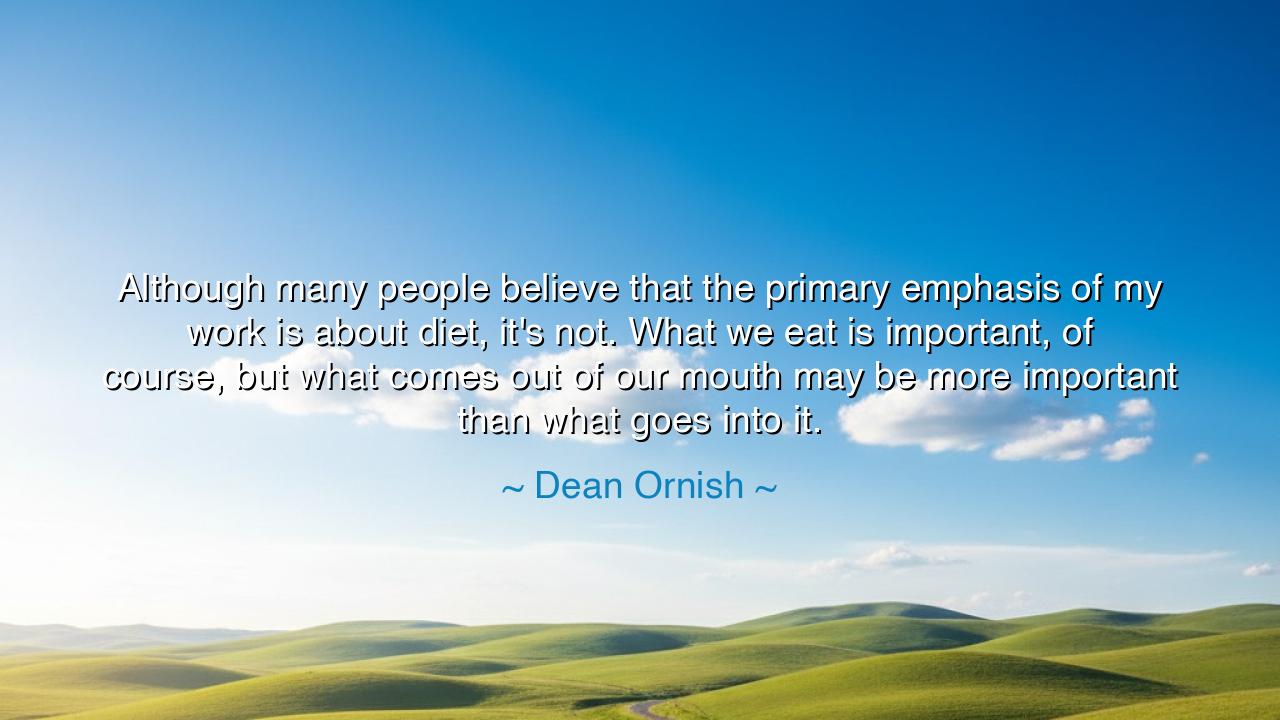
Although many people believe that the primary emphasis of my work
Although many people believe that the primary emphasis of my work is about diet, it's not. What we eat is important, of course, but what comes out of our mouth may be more important than what goes into it.






The words of Dean Ornish, “Although many people believe that the primary emphasis of my work is about diet, it's not. What we eat is important, of course, but what comes out of our mouth may be more important than what goes into it,” shine like an ancient flame of truth in a world obsessed with appearances. At first, they seem simple, even humble — a physician’s reflection on health. Yet beneath them lies a profound spiritual teaching, one that echoes through the halls of wisdom from every age: that true nourishment is not of the body alone, but of the heart, the mind, and the soul.
In these words, Ornish reminds us that speech — what comes out of our mouth — can heal or harm more deeply than any food can. Food sustains the body, but words sustain the world. The ancients knew this. The sages of India taught that sound itself was sacred — that the universe began not with sight or touch, but with speech, with the divine syllable Om. Thus, every word carries weight, every tone has consequence. The one who eats pure food but speaks impure words has fed only half his being; his tongue, sharp with judgment or cruelty, poisons what his stomach purifies. The wise understand that health begins not with diet, but with intention, and that the heart’s voice can nourish or destroy far more swiftly than the meal upon one’s plate.
Consider the tale of Aesop, the ancient storyteller of Greece. It is said that a wealthy man once commanded him to prepare the best and worst dish in the world. Aesop returned both times with the same offering: the tongue. “It is the best,” he said, “for through it we bless, we comfort, we love, and we teach. And it is the worst, for through it we wound, we deceive, we curse, and we betray.” The master was silent, for Aesop had spoken truth. So too does Ornish, centuries later, offer the same lesson: it is not only what enters the mouth that defines us, but what departs from it. Our diet may shape our flesh, but our words shape our destiny.
There is also a gentle warning in his message. Modern life worships the body — diets, supplements, and regimens — yet neglects the spirit that animates it. People count calories but not kindness; they measure nutrients but not compassion. Ornish’s insight restores balance to this imbalance. He does not reject the importance of what we eat, but elevates it to its rightful place — as part of a greater harmony of living. For what good is it to cleanse the body if one’s words pollute the air? To live healthily, one must not only eat clean but speak clean; to live wisely, one must not only nourish oneself but also those around them.
The power of speech is no small thing. History itself bends under its weight. A single word from Socrates could stir the conscience of a city; a phrase from Gandhi could move an empire; and likewise, the careless words of the cruel have sparked wars, broken hearts, and darkened generations. Words are seeds — some bear fruit, others bring poison. When we speak, we plant gardens or thorns in the minds of those who hear. Thus, Ornish’s teaching becomes not only a guide to personal well-being but a moral commandment: to choose words as carefully as we choose food, to feed others with gentleness and truth.
In the old scriptures, it was said: “From the abundance of the heart, the mouth speaks.” This means that our words reveal what we have allowed to dwell within. If we are filled with anger, resentment, or fear, our voices will carry their echo. But if we cultivate peace, gratitude, and love, our speech becomes medicine to all who listen. To guard one’s tongue, then, is to guard one’s soul. And in this, Ornish’s wisdom meets that of the ancients: health is not achieved by controlling appetite alone, but by mastering consciousness itself.
So let this be the lesson for those who seek wholeness: Eat mindfully, but speak even more mindfully. Let your meals sustain your body, but let your words uplift your world. Begin each day with intention — to harm none, to help many, to speak truth with compassion. When anger rises, let silence be your diet; when kindness stirs, let words flow like honey.
For in the end, it is not the food that enters us that defines our purity, but the spirit that leaves us through the breath of speech. To live well, therefore, is to feed both body and soul — with nourishment for the flesh, and gentleness for the heart. And those who learn this ancient art, as Ornish has reminded us, will find that the truest healing begins not at the table, but upon the tongue.






AAdministratorAdministrator
Welcome, honored guests. Please leave a comment, we will respond soon